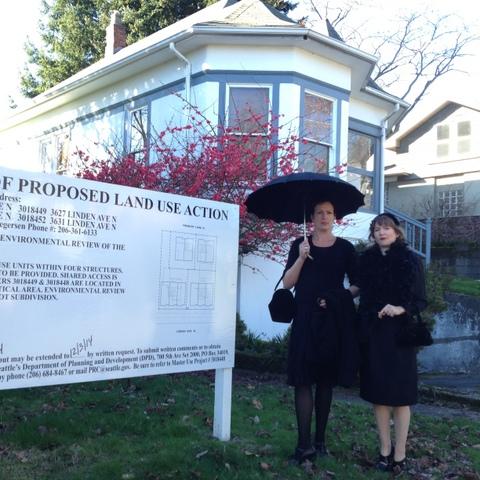At Large in Ballard: Six Wakes and a Requiem
Lesli Billings and Kris Royer Collins of Ballard Historical Society help Fremont mourn on Linden Avenue North.
Wed, 03/04/2015
By Peggy Sturdivant
Last weekend I attended six wakes and one requiem. The requiem, composed to put to rest the soul of an 18th century enslaved African, and performed by a 40 piece orchestra and 100 voice chorus, was the more uplifting. The six wakes, or “The Wake for Fremont’s Affordable Rental Houses,” organized by the Fremont Historical Society, did not carry a similar sense of redemption.
The 3600 block of Linden Avenue is just north of the Fremont Baptist Church, two blocks west of the troll and a few blocks north of a surviving Carnegie Library in Seattle. Six houses are slated for demolition on the block. All the houses were built before 1930, and most recently were rental homes. Barring a miracle they will soon join others recently demolished.
To call attention to the endangered houses and related issues, the Fremont Neighborhood Council and the Fremont Historical Society joined forces to plan a wake on Saturday, February 21, 2015. Wearing black, with some in vintage mourning attire, people stood facing out at the filled pews in the Fremont Baptist Church, “I am the R. L. Bartlett House. I was built in 1901. My tenants have been displaced. My status is Demolition on Hold.”
A wake is defined as a pre-burial gathering or a vigil for someone who has died. What made this gathering poignant is that these houses aren’t dead. Some of them have tenants who have been given notice but still tend their early blooming bushes. With the arrival of a backhoe and a demolition permit these houses dating back to the early 1900s will die quickly. A demolition crew can level and haul away a home in less than a day.
Starting with a sermon by neighbor and FNC member Leo Griffin the event emphasized that each demolition has widespread effects. The structures will be lost; some of them are lovely and could provide an elegant roof over a family’s head in another location. The people currently living in these houses will lose their homes and the reasonable rent that allows them to live in Fremont. Additional losses will include the lost green spaces, the plantings in the yards and the rich history of the block.
There are proposed land use action signs in front of each home. Two of them call for 35 units on a combined 6,720 square foot lot, such as the one at 3639 and 3643 Linden, after demolition of the existing 1901 and 1902 structures. This single project would add over 70 new neighbors to the street, and that’s before adding the proposed townhouses on other lots. Since the street is steep and the number of units exceeds even the “low-rise” zoning the city required an environmental review (SEPA). The SEPA report cited possible long-term impacts including: increased surface water runoff due to greater site coverage by impervious surfaces; loss of plant and animal habitat; traffic and transportation impacts. However, the SEPA decision was that environmental impacts are “non-significant.”
This Fremont block is within the area “upzoned” in 2011 as part of Seattle’s “Urban Village” overlay so the proposed developments don’t need to go through Design Review. The two larger buildings, totaling 70 units, also do not have to provide any parking.
Toby Thaler is a member of the Fremont Neighborhood Council, and someone who has filed a SEPA appeal with the city on the proposed developments on Linden Avenue North. As Toby put it, “If we had real neighborhood planning we wouldn’t have to be here at a wake.”
Leo Griffin, one of the organizers noted, “More houses have been lost in Fremont than we can possibly cover in this wake.” He explained that Seattle loses at least two historical homes per week.
Neighbors of the houses also stepped forward, many of them angry. “If you live in a single family residence in certain neighborhoods, you’re screwed. It’s a teardown.” Additional audience comments spoke to decreased affordable housing, “economic evictions,” poor design, parking issues, the correlation between lost affordable housing to homelessness, frustration with city departments and overall despair that Seattle’s growth is not being “managed.”
The sponsors urged the citizens to continue to share concerns, write City Council members, vote and attend candidate forums and the SEPA appeal hearing.
State Senator Frank Chopp, Speaker of the House, who was in attendance and was lauded as a longtime advocate for affordable housing, stated his opinion that city and state resources need to go toward preservation that promotes housing options. In his words: “So that we own it as a community.”
As though part of the mourning procession from wake to grave, I walked with several Ballard Historical Society members to look at the actual houses. They are good looking older homes on a north-south residential street that overlooks Lake Union. While driving back to Ballard I passed an encampment along Ballard Way, just across from the campers parked in the Post Office annex parking lot. My Ballard Historical Society passenger noted, “This is our housing for Ballard’s homeless.”


